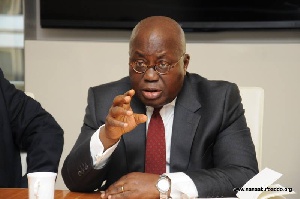The initiative by the present government to situate factories in the various districts in Ghana has been widely commended as a laudable initiative aimed at solving the unemployment situation in the country.
This is because the alarming rate of joblessness among the youth in Ghana continues to pose a major threat to national security.
Needless to say, unemployment serves as a breeding ground for the perpetuation of crimes by the energetic youth.
One-district, one-factory (1D1F) has the potential of boosting Ghana’s economy by enhancing Ghana’s foreign trade deficit (import to export ratio), thus strengthening the cedi against international trading currencies such as the United States (US) dollar and the British pound sterling.
While we continue to trumpet the ‘almost becoming’ cliché that Ghana is the gateway to West Africa and the preferred destination for the investor [‘blessed’ with natural resources such as gold, diamond, bauxite and now oil in commercial quantities, coupled with other factors such as the relatively high quality agricultural raw materials, affordable labour, a relatively stable democracy and the fact that Ghana has enjoyed relative peace since independence et cetera et cetera], our high cost of energy, which has a direct impact on production, and industrialisation automatically becomes the key turn-off for foreign investors and Ghanaians in the diaspora who may want to harness business prospects in Ghana, thus, the 1D1F.
Costs
In spite of the Public Utilities Regulatory Commission’s (PURC’s) announcement of a reduction in electricity tariffs effective March 15, 2018, Ghana still remains comparatively high on the price index for electricity tariffs in West Africa.
Commercial energy consumers are now required to pay $0.32 cents per kilowatt an hour while domestic consumers are charged as much as $19.28 cents per kilowatt an hour depending on their rates of consumption.
If you compare these rates to neighbouring Cote d’Ivoire who charge $0.13 cents (19 cents less) for commercial consumers per kilowatt an hour and $9 ($10.28 less) per kilowatt an hour for domestic users, you will immediately understand why industries are complaining, shutting down or relocating in some cases.
The tariff system in Ghana, where low power consumers pay less than high power consumers, is also another disincentive for potential manufacturers who consume high energy in their operations.
Tariffs
Although the tariff system is intended to discourage careless consumption of electricity, the attempt to lump in industrial consumers to limit their energy consumption or pay more for extra consumption is frantically imprudent because it will sooner or later limit production or result in losses or an eventual shutdown of industrial operations.
Is it not ironic that while Ghana is exporting energy to Cote d’Ivoire and Burkina Faso, factories in Ghana are relocating to Cote d’Ivoire and we are importing foodstuffs and other items from Burkina Faso?
High cost of energy leads to high cost of production and makes Ghana unattractive for the setting up of factories, thus generating a consistent increase in imports. This significantly explains why locally produced goods end up becoming more expensive than their imported counterparts in spite of the high duty charges at our various ports of entry.
The relocation or shutdown of factories that could earn Ghana some foreign exchange has had adverse effects on the strength of the cedi, with $1 now going for ¢4.85 and still wobbly.
In the 1960s & 70s, when we had the Komenda Sugar Factory, Tema Food Complex, Kumasi Shoe Factory, Aboso Glass Factory, Aveyime Cattle Ranch, Saltpond Ceramics, Kade Match Factory, Kumasi Jute Factory, Pwalugu Tomato Factory, Nsawam Cannery et cetera, Ghana’s import on consumables was less than 30 per cent.
Today, upon the closure of all these factories and more, Ghana imports over 90 per cent of its consumables.
The question is: How can a nation strengthen its currency if over 90 per cent of its consumables are imported?
Cost-effective energy
With the recent approval by Parliament for private sector participation in the management of the Electricity Company of Ghana (ECG) with Manila Electric Company of Philippines leading the bargain, it is expected that some changes may occur to guarantee efficiency in the service delivery of ECG. However, if the outcomes of these changes do not lead to a reduction in tariffs to the industrial consumer, it will be an encumbrance towards the realisation of 1D1F and a further deepening of the unemployment situation in Ghana.
The government must, as a matter of urgency, explore other cost-effective forms of energy such as solar, bio-energy, nuclear and wind energy in order to enhance Ghana’s pedigree as the business destination for West Africa.
Considering all the other business niceties Ghana brags about, the fact still remains that until we are able to adopt realistic measures that will ensure a drastic reduction in our cost of energy which ought to reflect in tariffs to consumers, the ‘almighty’ 1D1F initiative will continue to be a vision yet to be achieved.
Opinions of Friday, 3 August 2018
Columnist: Sylvester Forson















